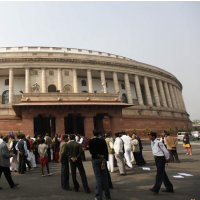Reform 01: Cabinet Decides to Raise FDI in Defence and Railways, But Reforms Face Political Resistance
 Parliament building in New Delhi (photo: AP)
Parliament building in New Delhi (photo: AP)
The cabinet has approved a plan to raise the amount of foreign direct investment (FDI) allowed in India’s defence and railways industries. This is the first key reform in Prime Minister Narendra Modi’s efforts to attract more foreign investment and revive the sluggish economy that is growing at its slowest rate in over two decades.
Yet the government’s gradual pace of reforms is already attracting resistance from both the left and the right of the Indian political spectrum.
According to Reuters, the government is to increase the FDI limit in the defence industry to 49 per cent from the current 26 per cent. India, the world's largest arms importer, wants to open up the domestic weapons industry to help boost domestic manufacturing and modernise its military equipment which is 70 per cent of Soviet/Russian origin.
Reuters quoted an unnamed senior cabinet minister, who said that FDI limits in railway infrastructure will also be completely removed, although foreigners will still be barred from investing in railway operations.
The country's vast railways network has suffered from years of low investment, resulting in a congested network with a worsening safety record. The railways reportedly spend 94 per cent of revenues on operating costs, leaving almost nothing for investment and expansion.
Cabinet approval for these plans was expected since Modi's two-month old government said it would ease FDI limits in its maiden budget last month. Yet pushing through these reforms and opening up the economy have already come up against early resistance.
Over the past week, the government has twice sought to introduce a bill opening up the insurance sector further – to 49 per cent from the current 26 per cent – but it has been blocked by opposition parties.
The ruling NDA alliance has a comfortable majority in the lower house of Parliament, the Lok Sabha, but has only 55 seats out of 250 in the upper house, the Rajya Sabha. This allows the Congress party and regional parties to block any legislation that they do not support.
Yet the Congress is in the awkward position of opposing the very legislation that it had proposed under the previous UPA administration.
“There are whispers that it could be because they do not want to give credit to Prime Minister Modi before he goes to the US (in September). I have reasons to suspect that is true. So, I can’t see otherwise any substantial reason for them to say we oppose,” said Nirmala Sitharaman, commerce and industry minister.
The Congress party, along with Samajwadi Party, Bahujan Samaj Party, Communist Party of India (Marxist), Communist Party of India, Dravida Munnetra Kazhagam and Rashtriya Janata Dal, want the Bill to be referred to a select committee.
The Biju Janata Dal and Nationalist Congress Party have supported the Bill, but the government lacks the required strength in the Rajya Sabha to pass it. The Bill is therefore not likely to pass in this session of Parliament that ends on August 14.
- Top Stories
- Controversies
- Where is the Money Going?
- India and the World
- Appointments and Resignations
- Unusual News
- Latest News
- India College Chain’s Expansion into U.S. Draws Opposition from Massachusetts Officials over Quality of Education
- Milk Shortages in India Tied to Release of New Movies Featuring Nation’s Favorite Stars
- Confusion Swirls around Kashmir Newspaper Ban in Wake of Violent Street Protests
- Polio-Free for 5 Years, India Launches Vaccine Drive after Polio Strain Discovery
- New Aviation Policy Could Increase Service, Lower Ticket Prices






Comments